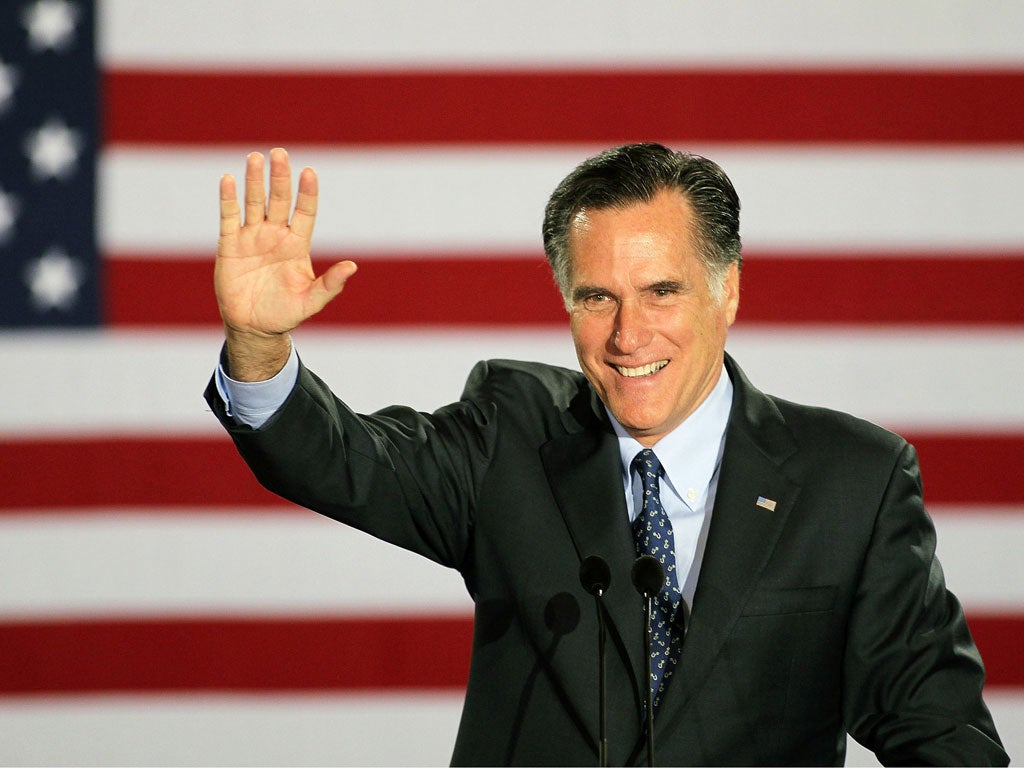Mitt Romney: Right's Mr Wrong can still win it
Mitt Romney has had rocky, gaffe-laden campaign so far. But the wealthy Republican candidate shouldn’t be written off yet

Mitt Romney comes from a distinguished line of political disappointment. As Governor of Michigan, his father, George Romney, made an energetic bid for the Republican nomination in 1968 only to be drubbed in the primaries. His mother, Lenore, ran for the US Senate in 1970 and lost by a two-to-one margin against her Democrat rival. Mitt tasted defeat first when he failed to dislodge Ted Kennedy from his US Senate seat in Massachusetts in 1994 and again in 2008 when his first quest for the Republican presidential nod ended in surrender to John McCain.
What kind of resume does this leave him? That he has dynamite personal ambition as well as striking looks would get mentions. But there is much else that makes him an interesting candidate for president. He is a Mormon who attended a Mormon university, Brigham Young in Utah, spent 30 months as a young missionary in Paris (where he almost died in a car crash) and eventually rose to be Bishop to his congregation in Boston. Married to his high school sweetheart, Ann Romney, with whom he has five sons, he can also claim impeccable family credentials.
It is however his spells as a highly successful businessman and co-founder of Bain Capital, the private equity firm, and as Governor of Massachusetts from 2003 to 2007 that feed more usefully into his case for becoming President of the United States. Never mind that both those sets of experiences also give pause to some voters. His success at Bain fuels the narrative of a very rich, out-of-touch man with horses and plans for a car-lift in a house under renovation in southern California. And his time as governor helped establish his reputation as a flip-flopper.
His skill in the private world – evidenced also by his rescue of the Salt Lake Olympic Games in 2002 – provides him with his best pitch to voters: that Barack Obama has failed to revive the economy sufficiently and he will do better. His vision is a fairly clear one, even if he has been reluctant to offer too many policy specifics. Whereas Mr Obama believes that government has a primary role in fostering economic growth, his faith in the power of free enterprise is unmitigated and pure. His platform of fewer regulations and lower taxes, he asserts, would unleash the great American entrepreneurial spirit once again and benefit all levels of society.
Yet, Mr Romney struggles to play the part of conviction politician. Rather, he looks like a shape-shifter, travelling the slide-rule of American politics according to the needs of the day. He won the governorship of Massachusetts declaring his support for abortion rights, a position he was later to abandon. He was the architect of universal healthcare for Massachusetts which became a template for Mr Obama’s health reforms, which today he promises to repeal. He said earlier this year no one fit to be president would deliberately pay more taxes than he owes. A week ago his 2011 tax filings showed that he had done exactly that to bring his tax payments to a respectable level.
It’s a problem if voters think a politician doesn’t believe in half of what he is saying. This seems to be afflicting Mr Romney. Worse, some of that distrust is coming from within his own party and notably from conservatives and the Tea Party flank who can never quite shed the notion that he is not really one of them, on social issue or on their demands for fiscal reform to slash social spending and take the budget deficit crisis seriously. By contrast, moderate Republicans and independents are tempted to think the opposite: that it was the phony Romney who won the Massachusetts governorship and that it is his conservative political persona that is more genuine.
That is what many voters may have taken away from what has surely been the most damaging episode in his campaign so far: the release by Mother Jones magazine of a video that showed him averring to a dinner of super-wealthy donors in Florida four months ago that he considered the 47 per cent of Americans who don’t pay federal income tax to be spongers on government, incapable of taking responsibility for themselves and “victims”. What happened to the “compassionate conservatism” that George W Bush ran on in 2000?
If Mr Romney adds to the family list of losses, the post-mortem will be harsh. Some will say he was sabotaged by rightward pull of the Tea Party. But blame will settle on him too, not least for the gaffes, whether the disparaging of the 47 per cent or the embarrassment of questioning Britain’s ability to stage the Olympics. They will ask this: how come someone so feted for his business acumen managed himself to be so undisciplined a candidate?
Who's Who in Team Romney
Stuart Stevens
A flamboyant character who once skied to the North Pole, Stevens is Romney’s chief campaign strategist. Blamed for Clint Eastwood’s excruciating turn at the Republican convention, he is the party’s prime behind-the-scenes mover.
Eric Fehrnstrom
Long-term lieutenant who formerly worked in journalism and advertising, Fehrnstrom is one of Romney’s most trusted aides and enforcers (despite controversially comparing the campaign to an ‘Etch-a-sketch’ children’s toy).
Paul Ryan
Young Congressman from Wisconsin – first elected at 28 – Ryan is best known for his hawkish approach to deficit-slashing, Romney’s running partner is popular with the Tea Party tendency but may be less so with floating voters.
Ann Romney
Despite time-consuming interests in top class equestrianism and children’s charities and a history of health problems, the putative next First Lady has played a prominent part in her husband’s campaign, presenting herself as a “Mitt-stabiliser”.

Join our commenting forum
Join thought-provoking conversations, follow other Independent readers and see their replies